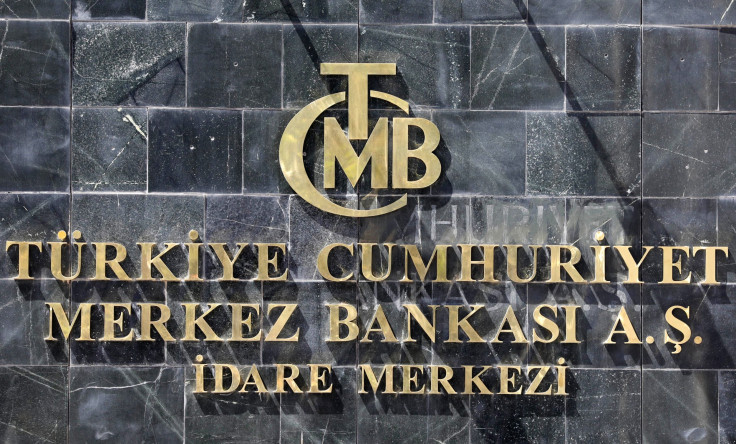Turkey Central Bank Will Wait For September Rate Hike Effects To Play Out

Turkey’s central bank is expected to keep interest rates unchanged at its Oct. 25 monetary policy meeting, ABN said, citing a swift decline in current account deficit and recent economic data releases that indicate a significant rebalancing trend in the country’s economy.
Given that monetary policy often takes a few months to translate into lower inflation figures, Nora Neuteboom, economist at ABN Amro, expects the Turkey’s central bank to wait to see the lagged effects of some bold actions taken in its September meeting which raised interest rates by 625 basis points (bps) to 24 percent.
“The main argument is for the central bank to just wait to see the October and November inflation figures. Perhaps if the data figures are much higher than what their current expected trend is, then they may go for a hike in December,” Neuteboom told International Business Times.
“The central bank may want to monitor price stability closely in the coming two months and, if it deviates from the baseline scenario (20.8 percent on end-2018), take action in December,” she added.
Apart from the rate hike, the Turkish government had also announced a few other measures -- dubbed The New Economy Plan -- to fight inflation in September.
Finance minister Berat Albayrak, who announced the measures, projected inflation to fall to 15.9 percent in 2019 on an annualised basis.
Turkish inflation reached almost 25 percent year-on-year in September, its highest level since August 2003.
Albayrak’s plan included a 10 percent discount on certain consumer goods, changes to lower the prices of fruits and vegetable, holding the prices of natural gas and electricity for the rest of this year and an acceleration in VAT rebates.
Neuteboom said these unorthodox measures by themselves were insufficient to counter high inflation. She expects them to have a small effect in the short-term, but said it will not solve the underlying structural issues that cause price pressures in the long term.
“I think Turkey has a history and tendency of coming up with really creative short-term solutions,” she said. “It’s not only for inflation, but for the banking sector as well. They made all sorts of new regulations and legislations for stitching all the wounds, but again the patient is still sick.”
The economist said Turkey has to curb credit growth to ensure the economy cools off and hike interest rates to contain inflation. She said although Turkey was doing that, it was focusing on short-term measures. “I think they are more damaging than helping in bringing inflation down.”
She expects Turkey’s inflation to rise to 28 percent in October, before falling to 24 percent in December. In 2019, Neuteboom sees inflation to stay above 20 percent until mid-year, before slipping to 12 percent in December 2019. ABN expects inflation for 2019 at 17.5 percent on an annualised basis.
NEGATIVE SENTIMENT FADING
Neuteboom said the negative sentiment toward Turkey has shifted and market confidence was returning. She pointed to the turnaround of the Turkish lira versus the dollar from levels of almost around 7 in August to current levels of below 6. The Turkish lira traded around 5.71 against the dollar on Wednesday.
She said the latest data on current account was a “remarkable recovery and very positive news.” Turkey’s current account switched to a $2.592 billion surplus in August, from $0.92 billion deficit a year earlier -- the first current account surplus since September, 2015.
“Confidence in markets has returned. Current account deficit was one of the biggest issues, the markets just didn't trust if Turkey could actually pay their deficits,” she added.
But she said this will impact inflation negatively. The shift in focus from “serving the domestic market” to “exporting basically everything” could lead to inflationary pressures within Turkey, she said.
Neuteboom said efforts by Turkish politicians to mend fences with the West by, for instance, solving the diplomatic spat with the U.S. over a jailed pastor has been really positive for Turkey.
In a major reversal Oct. 12, a Turkish court ordered the release of pastor Andrew Brunson, whose prosecution had rattled markets, and prompted Washington to impose sanctions on Turkey.
© Copyright IBTimes 2024. All rights reserved.





















